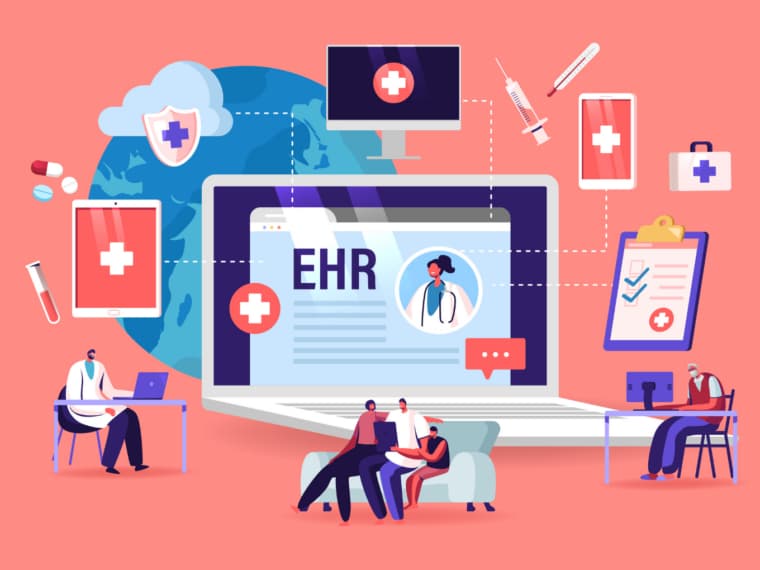
By analysing trends across large datasets, healthcare professionals can identify individuals at high risk of developing certain conditions
Healthcare practitioners can receive data immediately from devices that track blood pressure, glucose levels, heart rate, and other parameters in real time
People can better manage their medications, track symptoms, and keep an eye on their own vital signs when they have access to technology
Big data integration has revolutionised the healthcare industry in recent years, presenting new opportunities to customise care and enhance patient outcomes. The phrase “big data in healthcare” describes the gathering and examination of enormous datasets, such as those from genetics, electronic health records (EHRs), pharmaceutical prescriptions, imaging, and insurance information.
In addition, real-time data from smartphones, wearable technology, and Internet of Things (IoT) devices has increased the potential even further. The objective is quite clear: minimise medical errors while lowering expenses, increasing efficiency, and improving the quality of healthcare.
From Reactive To Preventive Care
The field of diagnostics is one where big data is creating the biggest impact. The sheer amount of medical data that is currently accessible, such as genetic data, lab results, and EHRs, enables quicker and more precise diagnosis.
Advanced analytics and machine learning algorithms can sort through this data and find patterns that the human eye might overlook. When diseases like cancer are detected early, treatments can be implemented at their most effective time. Thus, patients have better odds of recovering, fewer problems, and better prognosis.
Healthcare is increasingly moving toward a preventive model, thanks to predictive analytics. By analysing trends across large datasets, healthcare professionals can identify individuals at high risk of developing certain conditions and intervene before symptoms escalate.
For example, patients with early warning signs of heart disease or diabetes can be flagged for preventive measures, such as lifestyle changes or medications. This shift from reactive to preventive care not only improves health outcomes but also reduces the financial and logistical strain on healthcare systems by avoiding the costs associated with treating advanced stages of diseases.
Personalised Treatment Via Enhanced Health Monitoring
Patient monitoring has undergone many significant changes as a result of the combination of wearables, sensors, and mobile health applications. Healthcare practitioners can receive data immediately from devices that track blood pressure, glucose levels, heart rate, and other parameters in real time. Proactive treatments are made possible by this real-time data, which lowers the need for re-admissions to the hospital and enhances patient outcomes.
For instance, doctors can watch a patient recuperating after surgery from a distance, which enables them to identify issues early on without the patient having to come into the hospital. Patients who live in rural locations or have restricted access to medical services may especially benefit from this.
Healthcare professionals can develop individualised treatment plans that are updated in real time using patient data by using data analysis. Artificial intelligence (AI) models are capable of analysing test findings, vital signs, and even facial expressions to provide clinicians with exact treatment recommendations and actionable insights. With this dynamic method, medicines are always tailored to the specific patient, improving results and minimising unwanted effects.
A Lifeline For Chronic Disease Management
Chronic diseases including diabetes, high blood pressure, and heart disease are long-term issues that need constant attention and care. In addition to their widespread occurrence, these illnesses can induce complications and hospital readmissions when left untreated, which contribute significantly to global healthcare expenses. But thanks to big data’s potential, chronic illness management is changing, improving patient care while cutting expenses.
Big data is powerful because it can anticipate problems and take action before they arise. Healthcare providers can spot early indicators of a possible health catastrophe by looking for patterns in a patient’s data. For instance, persistently high blood pressure readings in hypertensive patients may indicate a higher risk of heart attack or stroke.
Physicians can use this information to plan emergency procedures, suggest lifestyle modifications, and modify medicine before the patient’s condition gets worse.
This preventative strategy lowers the risk of hospitalisations and emergency visits in addition to the possibility of life-threatening consequences. Consequently, this enhances the patient’s standard of living and lessens the financial strain on the healthcare system and the patient.
Empowering Patients, One Stat At A Time
Big data is not only changing the way doctors treat long-term illnesses, but it is also giving patients more authority to manage their own health. People can better manage their medications, track symptoms, and keep an eye on their own vital signs when they have access to wearable technology, smartphone health applications, and online patient portals.
Patients can make well-informed decisions about their daily routines, including nutrition, exercise, and medication adherence, with the assistance of these technologies, which offer real-time feedback and practical insights.
Improved self-management results in better health outcomes, fewer hospital visits, and an overall higher quality of life for individuals with chronic illnesses by encouraging a greater sense of self-awareness and responsibility.
The Way Forward For Data-Driven Healthcare
Big data is transforming healthcare by making it possible to provide more proactive, efficient, and individualised care. The incorporation of large datasets into healthcare systems is creating new opportunities for resource optimisation and patient outcome improvement, ranging from precision medicine to predictive analytics.
Notwithstanding, several obstacles persist, including worries about data privacy, difficulties with integration, and guaranteeing fair access to new technologies. The future of individualised treatment will surely be greatly influenced by the power of data as the healthcare sector continues to change.
The adventure is only getting started, but the potential is enormous. In order to guarantee that every patient reaps the rewards of big data and precision medicine, the healthcare industry must embrace this transition.































 Ad-lite browsing experience
Ad-lite browsing experience